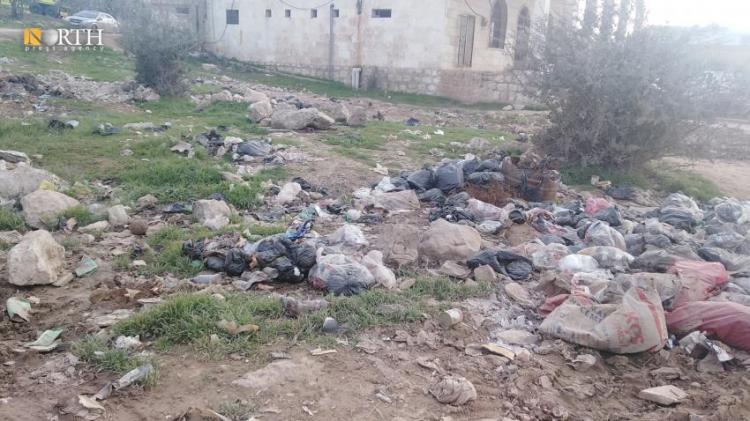The dire service situation in al-Qahh, another kind of suffering
Idlib – North-Press Agency
The residents and the internally displaced people in the town of al-Qahh, located on the Syrian-Turkish borders in north of Idlib, undergo poor service and health conditions amid the neglect of the organizations and the concerned authorities in the ‘Salvation Government’ of Hayat Tahrir al-Sham HTS.
Ibrahim Saeed, a young man from the town of al-Qahh told North-Press that the services in the town are very poor and are at their worst, as the potholes spread in the roads of the town, as it is filled with rainwater in winter, which impedes traffic and pedestrians; in addition, it is a major cause of traffic accidents, where every day must be an accident. He added that the roads in the town were not paved for more than 15 years, which increases the burden of drivers because of the many breakdowns of their cars due to the many potholes, where the slang expression spread among all car owners in al-Qahh "No end for maintenance.”
Car owners say that they have to take their cars for maintenance many times during one month, despite the very high maintenance costs, which is linked to the price of the dollar.
In addition, Farid al-Ghabi, a resident of al-Qahh said that the town is full of garbage and dirt, which cause the spread of diseases and epidemics, especially among children, mainly leishmania.
In 2018, Mentor International launched a campaign to fight against leishmaniasis in cities and towns in western Idlib countryside to reduce its outbreak among the population.
The spokesperson for the International Committee of the Red Cross, Enji Sidqi announced during an interview with Al-Quds Al-Arabi newspaper, that there were more than 150,000 cases of leishmaniasis in 2017 across Syria.
In addition, the town of al-Qahh suffers from the lack of drinking water due to the interruption of the main water network for more than 6 years, as people depend on purchasing water from the tanks at high prices, and the price of a water tank with capacity of 35 barrels, reaches 8,000 Syrian pounds.
The families of the area usually store water in primitive water pits and the capacity of each pit varies according to their depth and area, to reach in some of them more than 50 barrels.
The head of the local council in the town of al-Qahh, Muhammad Saeed Jallo explained that the council is based on running the town, but its capabilities are very weak as it depends on humanitarian organizations and associations as a result of the lack of an official body affiliated with it, pointing out that the ‘Salvation Government’ did not provide anything to the town under the pretext that there is not a sufficient budget.
Jallo estimated the number of the population in the town at more than 20 thousand people, adding: "The council has submitted several studies to the organizations regarding the service situation in the town, but it went to no avail.”
Regarding the hygiene sector, Jallo said that the council worked to employ a number of workers with varying salaries despite the weak capabilities due to the lack of organizations that support their projects, explaining that the works of the organizations in the town are limited only to emergencies for the IDPs in the town.
There are several camps in Idlib governorate that were established during the war years in Syria, in addition to random ones, following the recent clashes between the Syrian government forces and the armed opposition groups in Idlib.
Musab Abu Mustafa, who works in the field of documenting camps statistics, told Ain al-Madina magazine that “the number of IDPs in Atmah amounts to 123 thousand people, including 57 thousand children and more than 23 thousand women spread in various camps, most notably al-Karama, al-Shaheed Saleh, Sarkhet al-Tefl, and Tajamoa Douaat al-Kuwait,”
Abu Mustafa explained that 44,520 people reside in the camps of al-Qahh, the most prominent of which is Tajamoa Shohada Abdeen, Tajamoa Shohada Khan Sheikhoun, al-Furqan, al-Midan, and Abnaa Homs, while the rest of the IDPs are distributed in the camps of Aqrabat, Deir Hassan, Sarmada and al-Dana on the Syrian-Turkish borders.

